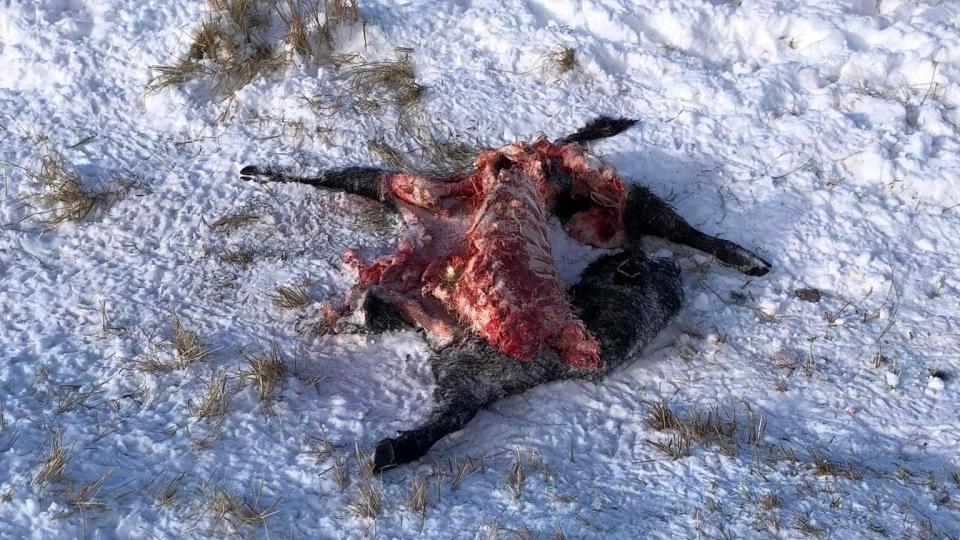Colorado wildlife officials confirm wolf kill of cow near Walden, will compensate rancher
Colorado Parks and Wildlife officials have confirmed a wolf kill of a cow calf near Walden following a field investigation and necropsy.
An agency district wildlife manager received a report of a calf carcass on a ranch in Jackson County around 9 a.m. Sunday and confirmed the killing in a news release late Tuesday afternoon.
"The results of this investigation indicated wolf tracks in the immediate vicinity of the carcass and wounds on the calf consistent with wolf depredation,'' the wildlife agency's area wildlife manager Kris Middledorf said in the release.
It is believed to be the first wolf kill of domestic livestock in Colorado in more than 70 years. Wolves were largely killed off in the state by the 1940s, though several have wandered in and out of the state since then.
A wolf pack of two adults and six pups have been confirmed to be in the area near Saturday night's kill. Earlier this year, an archery elk hunter captured on video wolf pups north of Walden that were the first to be born in Colorado in 80 years. Colorado Parks and Wildlife officials have been monitoring the pack since June.
How much has Colorado paid out for wildlife damage?
The wildlife agency will reimburse the rancher for the loss of the 7-month-old, 500-pound heifer calf under its current game damage process, same as if the depredation occurred by mountain lions or bears. The agency is in the process of formalizing an official process for damage by wolves, which is mandated as part of last year's ballot initiative that voters narrowly passed to reintroduce wolves into the state.
In fiscal year 2020, the state wildlife agency paid $447,100 for 183 wildlife damage claims. The cost is 41% below the past five-year average of $755,744. The decrease is largely attributed to fewer and lower claims for bear depredation on livestock and a 33% reduction in growing crop claim compensation compared with last year, according to the wildlife agency.
Wolves in Rocky Mountain National Park?: Some believe it should be a release site
Terry Frankhauser, president of the Colorado Cattlemen's Association, said a commercial grade cow of the weight of the one killed has a value of $1,500 to $1,600 but that a purebred like the one killed would have higher value.
Frankhauser said the ranch owner has been trying to coexist with the pack and has taken measures to protect his cattle. He said there is plenty of wildlife for the wolves to eat in the area but still the wolf kill took place.
He said the ranch owner had seen wolf tracks around his home and buildings for several weeks and the kill site is very near the rancher's house.
"This is the sentinel example of the reality of the decision we have made,'' Frankhauser said of last year's ballot initiative. "We are not here to litigate what the people have voted for but we should going forward do so with eyes wide open. The political, not biological, decision comes at a cost.''

Rob Edward, strategic adviser for the Rocky Mountain Wolf Project, which spearheaded the ballot initiative, said his group is committed to helping keep these sorts of incidents to a minimum by supporting non-lethal co-existence projects.
The ballot measure requires the Colorado Parks and Wildlife Commission to develop a plan to introduce gray wolves west of the Continental Divide, with wolves on the ground no later than the end of 2023.
Colorado Parks and Wildlife continues to work on a wolf reintroduction plan through public open houses, stakeholder groups and wildlife expert meetings.
The wolves that are believed to have killed the cow naturally migrated to the area. The pack's location is east of the Continental Divide near the border with Wyoming, where it is legal to hunt wolves.
Wildlife agency director Dan Prenzlow said CPW is working on draft regulations for the hazing of naturally migrating wolves to minimize the likelihood of conflict or depredation as the state works on its wolf restoration and management program.
"While the news of a cow killed by wolves is not surprising, it is also a symbol of the work ahead,'' Edward said. "The Rocky Mountain Wolf Project, along with our colleagues in the conservation community, remain committed to finding practical solutions for coexisting with wolves. That’s why we’ve supported the proposed rules for hazing wolves currently under consideration by CPW.''
Gray wolves remain a state endangered species and may not be killed for any reason other than self-defense. Illegal take of a wolf may result in a combination of penalties, including fines of up to $100,000, a year of jail time and a lifetime loss of hunting license privileges.
Not Colorado's first reintroduction rodeo: A look back at how the state brought back lynx
How to report a wolf sighting
Colorado Parks and Wildlife urges people to contact the agency immediately and fill out a report if they see or hear wolves or find evidence of wolf activity in Colorado. The Wolf Sighting Form can be found at https://cpw.state.co.us/learn/Pages/Wolf-Sighting-Form.aspx.
Reporter Miles Blumhardt looks for stories that impact your life. Be it news, outdoors, sports — you name it, he wants to report it. Have a story idea? Contact him at milesblumhardt@coloradoan.com or on Twitter @MilesBlumhardt. Support his work and that of other Coloradoan journalists by purchasing a digital subscription today.
This article originally appeared on Fort Collins Coloradoan: Colorado wildlife officials confirm wolf kill of cow, will pay rancher

